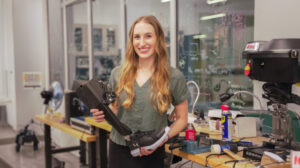 Mechanical engineering graduate student Kai Pruyn, student in the HGN Lab for Bionic Engineering, is a recipient of the National Science Foundation’s Graduate Research Fellowship Program (NSF GRFP). This prestigious fellowship supports outstanding doctoral and research-based master’s students doing research in science, technology, engineering and mathematics, or STEM, disciplines.
Mechanical engineering graduate student Kai Pruyn, student in the HGN Lab for Bionic Engineering, is a recipient of the National Science Foundation’s Graduate Research Fellowship Program (NSF GRFP). This prestigious fellowship supports outstanding doctoral and research-based master’s students doing research in science, technology, engineering and mathematics, or STEM, disciplines.
Established in 1952, the NSF GRFP is the oldest fellowship program of its kind. The 2024 fellows receive a three-year annual stipend of $37,000, a $16,000 cost of allowance for tuition and other costs, and numerous research and professional development opportunities.
This fellowship recognizes that despite only being in her first year as a Ph.D. student, Pruyn is already at the forefront of developing technology that promises to transform lives. Her work on hip and ankle exoskeletons for stroke patients represents a major leap forward in rehabilitative care, offering newfound hope for enhanced mobility. What makes this work remarkable is not just the scientific innovation but the tangible impact on individuals.
“There’s an older gentleman that I work with a lot who has had a stroke,” said Pruyn. “He does a happy dance every time he comes in because he’s so excited to use the exoskeleton, which brings me so much joy. It really breathes life into the research that we get to do.”
Pruyn’s journey into bionic engineering began with a passion for powered prosthetics, fueled by an undergraduate research experience aimed at supporting women in STEM. This early exposure to research ignited a curiosity that evolved into a dedicated career path.
Looking to the future, Pruyn is committed to pushing the bounds of bionic engineering. Whether her path leads her to academia or industry, her dedication to leveraging technology for the betterment of human mobility shines brightly. As she continues her Ph.D. journey, one thing is clear: Pruyn is not just engineering devices; she’s engineering hope.